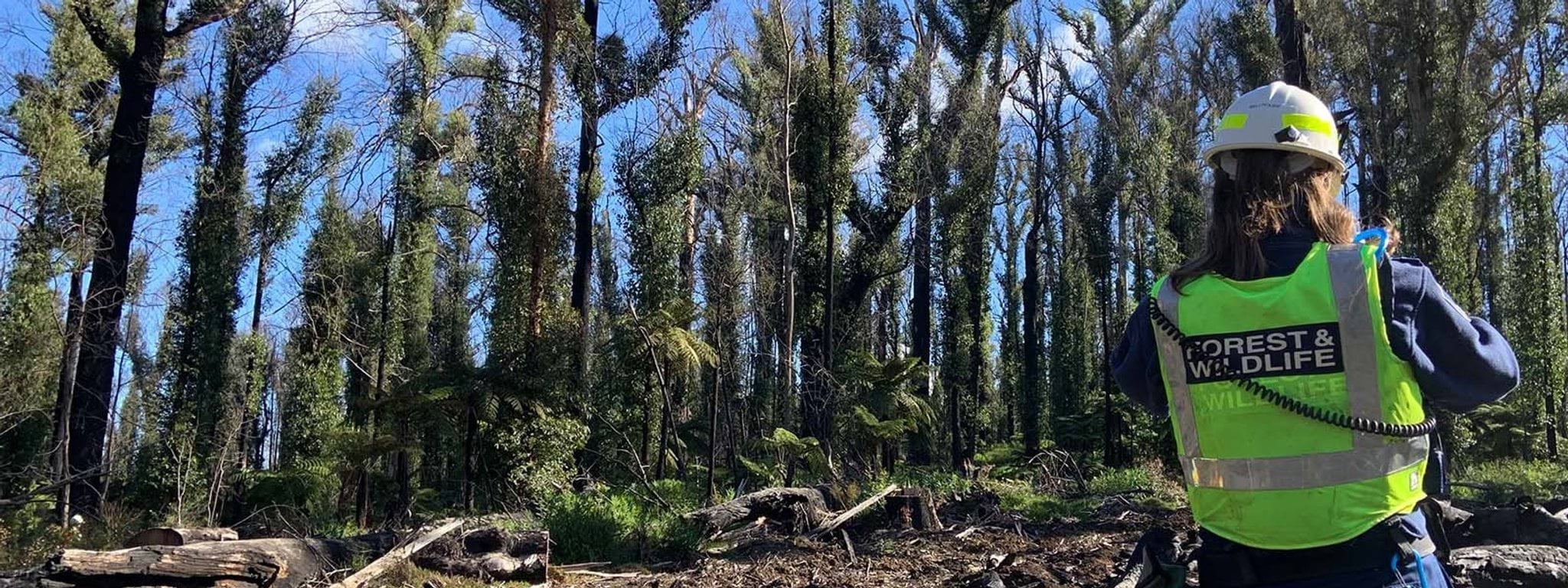In response to the risks of illegal campfires, illegal possession of wildlife, illegal commercial timber harvesting in state forests, illegal take of firewood and illegal vehicle use, Conservation Regulator has identified why non-compliance can happen, what we aim to achieve, how we will do this, who we work closely with, and its priority.
Illegal campfires
Why non-compliance can happen
- High visitor numbers, especially while travel is restricted
- Lack of awareness of regulations
- Lack of awareness of how to safely manage campfires, and how quickly and easily they can become out of control
- Lighting fires on day of total fire ban
We aim to
- Raise awareness of the regulations, reduce the prevalence and risk of unauthorised campfires
How we do this
- Providing clear information about campfire regulations and campfire safety on DELWP’s website, customer centres, during patrols and through media campaigns
- Supporting the annual Don’t let your campfire become a bushfire campaign, reminding campers across the state to be alert when it comes to campfire safety
- Intelligence analysis of reports of unsafe behaviours and high-risk times and locations
- Conducting surveillance and patrols in high-use, high-risk locations, during fire hazard days, and targeting high-risk behaviours
- Investigating reports of unsafe campfire activities
- Where appropriate, initiate enforcement actions
- Publicise enforcement actions
We work closely with
- Parks Victoria
- Forest Fire Management Victoria
- Country Fire Authority
Priority
- We will enforce compliance at any time but this is a priority between September and April
Illegal possession of wildlife
Why non-compliance can happen
- Lack of awareness of regulations
- Economic gain through illegal trade
- Lack of awareness of the harm non-compliance can do to wildlife habitats
- Disregard for the welfare of animals
We aim to
- Raise awareness of the regulations and improve the protection, conservation and interaction with Victoria’s wildlife
How we do this
- Publish a Statement of Regulatory Intent on Wildlife
- Publish information on how to apply for a licence, permit or authorisation on our website
- Deliver information and guidance to support a common understanding of how to comply with the law
- Support licence and permit holders in understanding their obligations to prevent non‑compliance
- Administering permissions under the Wildlife Act 1975
- Reforming wildlife permissions, initially focusing on Authorities to Control Wildlife
- Use community information and other intelligence to target our compliance and monitoring activities
- Monitor compliance with licence and permit conditions
- Investigate and respond to wildlife crime, prioritising serious and significant incidents
- Publish information about our major operations through a variety of channels, such as our website and Twitter
- Publicise enforcement actions
We work closely with
- The Department of Jobs, Precincts and Regions
- Game Management Authority
- Parks Victoria
- Victoria Police
- Agriculture Victoria
Priority
- This is an ongoing priority through 2021 – 2022
Illegal commercial timber harvesting in State forests
Why non-compliance can happen
- Pressures to maximise production volumes to meet customer needs and minimise costs of harvesting
- Inconsistent application and interpretation of the law, including the application of the precautionary principle within the Code of Practice for Timber Production 2014
We aim to
- Ensure that timber allocated to VicForests for harvesting in State forests is managed in line with the law and code of practice, to protect forests for current and future generations
How we do this
- Providing information to VicForests to comply with its obligations under the law through clear statements of regulatory expectation and guidance
- Ensuring that the standards and guidance for complying with the law are clear and well communicated to VicForests
- Delivering education campaigns and engagement events to achieve a common understanding of the regulatory framework
- Conducting surveys and assessments under the Forest Protection Survey Program
- Conducting forest and compliance audits and inspections
- Investigating reports of non-compliance and threatened species
- Initiating appropriate enforcement action for non-compliance
- Publicise enforcement actions
We work closely with
- Department of Jobs, Precincts and Regions
- DELWP Forest Fire and Regions – Policy and Planning Division
- DELWP Biodiversity Division
- Arthur Rylah Institute
Priority
- This is an ongoing priority through 2021 – 2022
Illegal take of firewood
Why non-compliance can happen
- Lack of awareness of regulations
- Economic gain by commercial operators selling to unaware consumers
- Energy prices and cost of wood from legal suppliers
- Diminishing resources due to climate change and overuse
- Perceived low risk of detection and consequences
We aim to
- Raise awareness of the regulations, and the consequences of unauthorised collection
- Increase the likelihood of detection
How we do this
- Implementing the Conservation Regulator’s regulatory strategy for the illegal take of firewood
- Designating firewood collection seasons (Autumn and Spring)
- Signage and pamphlets at designated collection areas
- Restricting zones for access to firewood collection
- Targeting the illegal removal of commercial quantities of firewood
- Providing clear information on the DELWP website about designated areas and regulations
- Intelligence analysis of reports of high-risk areas, behaviours, and times/seasons to inform targeting of surveillance and patrols
- Increasing surveillance of high-risk areas
- Investigating reports of illegal activities
- Where appropriate, initiate enforcement actions
- Publicise enforcement actions
We work closely with
- Parks Victoria
- Forest Fire Management Victoria
Priority
- We will enforce compliance at any time but this is a particular priority between April and October
Illegal vehicle use
Why non-compliance can happen
- Decreasing costs of off‑road vehicles and trail bikes
- The increasing trend towards individual activities
- Lack of awareness of regulations
- Proximity to peri-urban and large regional centres
- Easier access to public land due to clearings made by fires
We aim to
- Raise awareness of the regulations, reduce the prevalence and risks associated with illegal vehicle use on public land
How we do this
- Clear signage and information brochures at point of entry/use
- Providing clear information on the DELWP website and through media about designated areas and regulations
- Restricted zones and seasonal road closures
- Community engagement
- Management and maintenance of vehicle tracks including fencing and barriers to reduce access
- Intelligence analysis and increasing surveillance
- Patrols including in high-risk areas and targeting high-risk behaviours
- Investigating reports of illegal and unsafe activities
- Where appropriate, initiate enforcement actions
- Publicise enforcement actions
We work closely with
- Parks Victoria
- Victoria Police
- DELWP Forest, Fire Operations Division
Priority
- We will enforce compliance at any time but this is a particular priority between April and October
Updated





